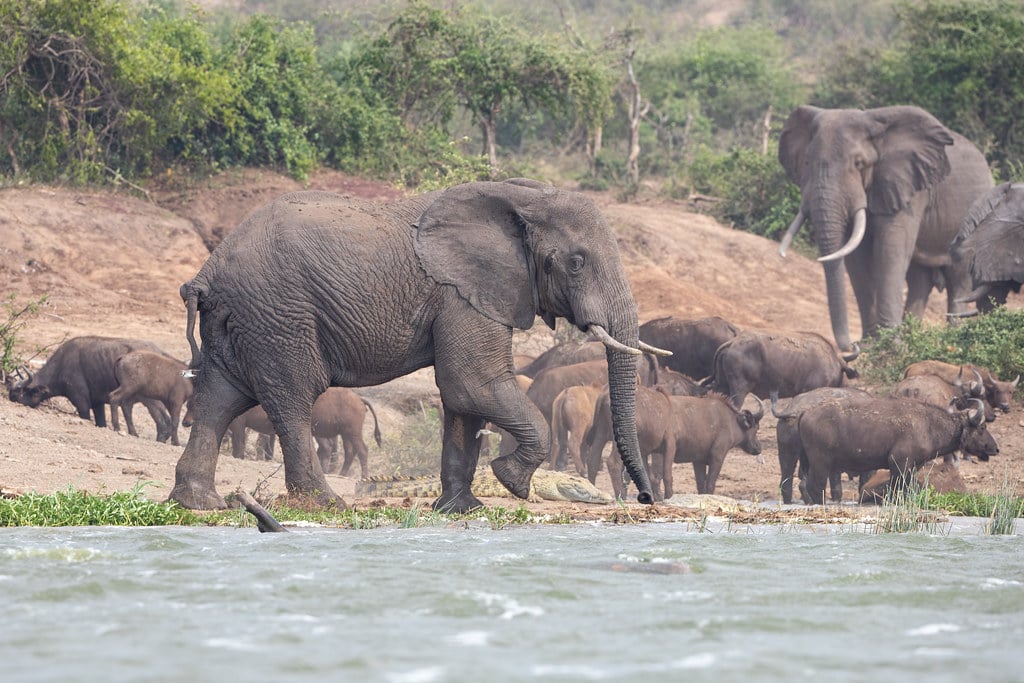Community-based groups and civil society organisations in Uganda and the Democratic Republic of Congo (DRC) are urging multinational oil companies to keep off a new biodiversity-rich oil exploration block opened in Western Uganda’s region.
The groups are asking fossil fuel giants Total E&P, China National Offshore Oil Corporation (CNOOC) of China, and Australia’s DGR Global Ltd, among others, to withdraw their interest in the Nganji oil explorations block, one of the largest areas opened to potential resource extraction in the second round of offers for exploration licenses announced by the government of Uganda in May 2019.
The five organisations opposing the move represent a coalition of over 40 community-based organisations (CBO) and civil society organisations (CSO), including the 11-member coalition of Kasese women and youth clean energy clubs and the seven members of the Kasese CSO Coalition to Safeguard Biodiversity. The organisations fear that the any prospecting in Nganji block — which covers an area of 1,230 square kilometres — will harm biodiversity-diverse Queen Elizabeth National Park (QENP) and Lake Edward, a cross-border UNESCO-designated World Biosphere and Humanity Reserve, shared by Uganda and the DRC.
The coalition also cites fears of climate change, environmental degradation, loss of livelihoods due to impacts on sectors such as tourism and fishing, and increased human-wildlife conflicts.
The area targeted for exploration is “part of the greater Virunga landscape on which we communities in Uganda and DRC are dependent for our livelihoods,” the groups noted in a letter sent to the oil companies and the presidents of Uganda and DRC on June 30.
The letter is also addressed to Petro Afrik Energy Resources East Africa Limited, Niger Petroleum Resources Ltd, and Uganda National Oil Company, in addition to Total, DGR and CNOOC. All the companies have been shortlisted for the Nganji exploration license.
While Uganda is pushing forward with exploring oil fields in the larger Albertine region, production has been delayed due to the upcoming construction of a controversial Total-led multibillion dollar export pipe known as the East African Crude Oil Pipeline (EACOP).
“Since 2015 when the Uganda government first put up the Nganji block up for exploration, we have vigorously campaigned against licensing of the block leading to companies keeping away. We do not understand why the Uganda government reopened the same for licensing in 2019,” the petitioners write in the letter.
None of the companies or governments have yet to publicly respond to the organisations’ letter.
On the environment, the groups contend that communities have suffered from elephant and other wildlife attacks, and fear that these will get worse when activities commence in the park and lake, driving the animals out of the wild and closer to homes and towns. This was already being witnessed in other parts of the country where oil has been found and is awaiting production.
They noted: “We are worried over the environmental destruction that follows oil activities in Africa. In Uganda we have seen forests come under immense pressure.” As people lose their land to oil projects, some end up farming in the forests for food and livelihood instead. In other instances, people may try to take forest land under the guise of pursuing oil projects. All of this can lead to increased human-wildlife conflict as well, the groups warn.
The groups gave the example of the besieged Murchison Falls National Park, located in the same Albertine region as where the new oil exploration block is being offered. In this instance, sections of the park were paved to make way for drilling. The result has been increased intrusion on people by wildlife. Extraction in this area is due to commence any time now.
The groups worry that similar conflicts would no doubt result in QENP and Lake Edward if oil exploration were to take place there.
Fisheries and tourism would also come under pressure. QENP is the second most visited game reserve in the country, home to 612 bird species, 95 animal, and 57 plant species in addition to the famous tree-climbing lions and the Topi antelope. The tourism sector brings in US$1.6 billion annually according to official data.
Fisheries in Lake Edward have earned thousands of fishermen nearly US$540 million combined annually, which would not be guaranteed if exploration was allowed, the petitioners claim, citing Uganda National Fisheries Resources Research Institute.
According to the African Institute for Energy Governance (AFIEGO), any activities in pursuit of fossil fuels in Nganji would leave two of Uganda’s most valued nature reserves besieged. “Allowing drilling in the Nganji block would send the wrong signal to neighbouring DRC,” warned Diana Nabiruma head of communications at AFIEGO. “It encourages the country to also begin oil exploration on its side of the border, and in the Lake Edward part that is in its territory, spelling doom for the environment and the water body.”
Subscribe to our newsletter
Stay up to date with DeSmog news and alerts







